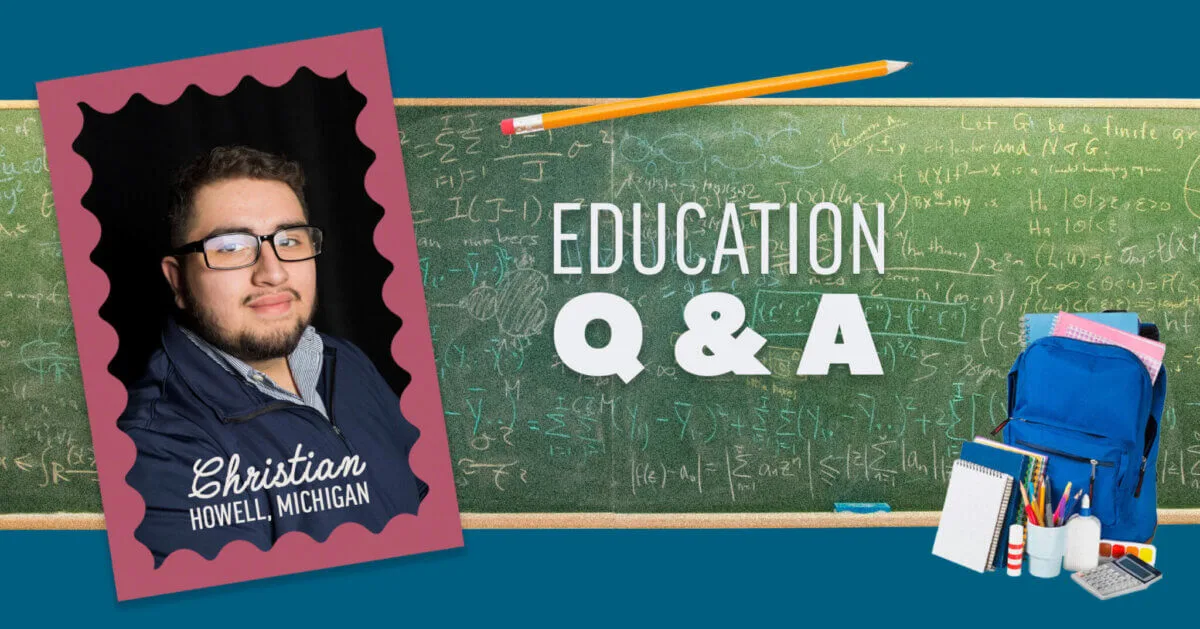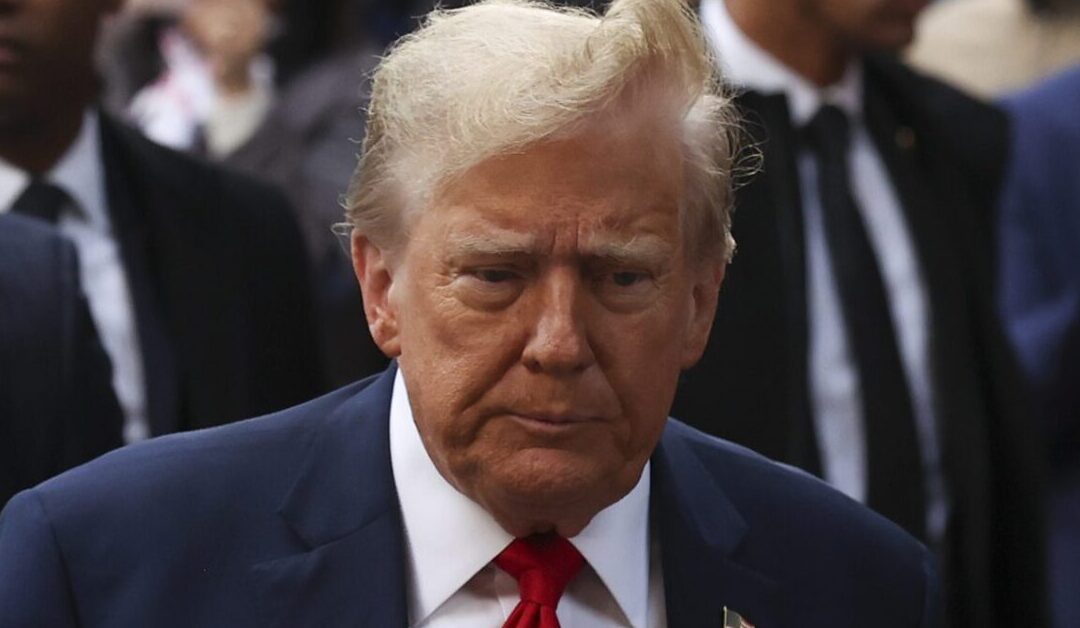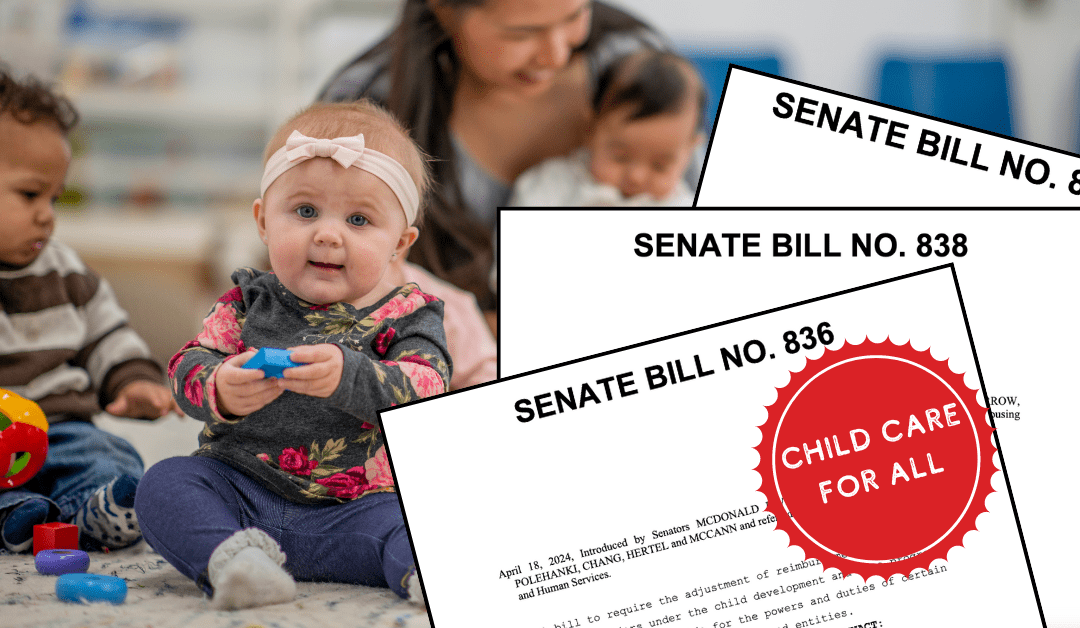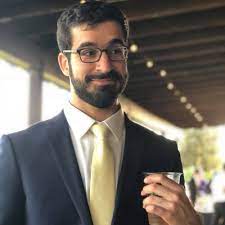
Graphic by Desiree Tapia
“Public school is an opportunity. It’s a golden ticket, if you will, to a really good future.”
Last week, we published the first in a series of Q&A interviews with Michiganders who want to share their thoughts on public education. As part of this ongoing series, we’re talking to parents, teachers, students, and others involved in Michigan’s public schools. If you’d like to be part of the conversation, email [email protected].
This week, we spoke to Christian Alvarado, an education organizer with Oakland Forward, a civic engagement nonprofit based in Oakland County. Christian now lives in Howell, but previously spent five years working as a special education parapro in the Ypsilanti public school district.
This interview has been edited for clarity and brevity.
Did you go to public schools? What were your experiences like?
From kindergarten through 8th grade, I went to Catholic school in the Dearborn Heights area. I went to Salem High School [a public school], and after graduating went to Baker College for my business degree. Going to private school my first eight, nine years has really shown me a vastly different world. From going to public school, I can really appreciate how much they need. They need the community to come together and show support, because when we don’t have any support or any buy-in from the community and parents, the schools start to fall apart.
There are those who say that the recent attacks on public schools—ranging from efforts to divert funding to private and charter schools, to limiting how teachers talk about race and LGBTQ identity—are part of a long-term effort to weaken and ultimately destroy public schools. Would Michigan communities suffer if public schools didn’t exist, and if so how?
If we lose public schools—especially the way they are right now, where they’re publicly funded—we are going to have kids that just plain don’t go to school, period. If there’s not a charter in their area and their parents can’t afford to send them to a private school, these kids are just not going to be able to go to school–and that’s going to be a lot of kids. Maybe just a few here in this neighborhood, a few here in that neighborhood—that adds up. You do not want a Michigan that has a large percentage of people that didn’t even go to kindergarten. That’s the kind of future that would happen if we lose public schools.
If we lose public schools—especially the way they are right now, where they’re publicly funded—we are going to have kids that just plain don’t go to school, period.
CHRISTIAN ALVARADO
On top of that, the other things that we consider as education but don’t really think about [in this debate] are after school activities. When you take away all those after school activities because public schools no longer exist, where are these kids going to go after school? They’re going to get into trouble. And part of why we have these after school activities is to help keep kids involved, keep them going and keep them excited about living life in the community and going to school and also not get into trouble. We don’t want our kids to fall between the cracks and end up in the judicial system. That’s not what we’re about. We want to make sure that our kids are always taken care of, even the small things, playing some football, playing some baseball after school, softball, gymnastics that’s so important to have for our kids and it would be lost if we didn’t have public schools.
There have been a lot of funding cuts and attacks on public schools in recent decades, but what is a positive vision for the future of public schools in your community? What do parents you talk to want to see?
They just want the teachers to be there. They want the teachers to be there and to teach and to get the information out to their kids, be supportive, and put a little bit of extra time in with their kids if they need it and that’s something that public schools do, unlike charters and unlike private schools. I know, I went to a private school from K-8. My parents, lucky enough for me, got me outside of school help and they paid for it, but if I didn’t grow up as privileged as I did, I would have fallen through the cracks. I would have a really hard time reading right now and speaking to you and doing basic math, but luckily for kids that go to public schools, all that is in there. That comes with just signing your name on the line. You get all of these things. And if you have special needs? Guess what, we’re going to take care of you, too.
Maybe just a few here in this neighborhood, a few here in that neighborhood—that adds up. You do not want a Michigan that has a large percentage of people that didn’t even go to kindergarten. That’s the kind of future that would happen if we lose public schools.
CHRISTIAN ALVARADO
Are you worried about the attacks on public schools and the long-term impact they might have on public education in Michigan?
There’s a lot of misinformation out there, especially on Fox News and OAN and Newsmax, where I think a lot of the parents that are worried about this—I think that’s the only news they watch and that can be very troubling, especially when you do deep dives in these networks. Critical race theory isn’t even taught in elementary schools or even in high schools. That’s a college level class. To be worried that your kindergartener is going to be involved in CRT is silly, it’s just not going to happen. But other things like the ‘Dont Say Gay’ bill [which limits discussion of LGBTQ identities in classrooms], that’s going to be more impactful on children, especially children who are kind of confused and may think they are or know for a fact they are gay, trans, LGBTQIA—they are going to be affected. They are going to feel othered. The one thing I always stood hard against when I was an educator was bullying. We can’t have bullying… We are trying to move forward as a more tolerant society and that’s just pushing us back.
What is the purpose of public education and what does it mean to you?
Public school is an opportunity. It’s a golden ticket, if you will, to a really good future and you don’t have to go to college. You can go to a trade school. But I think almost every public education system prepares children for their future, and if they can do that, whether they go to trade school, go to college for two years, four years, hell maybe even go for eight years and become a doctor, whatever it is, public education is an opportunity.
Is there anything else you want to add?
I think it goes without saying that our teachers are fantastic. They’re teaching the future but they are underpaid and undervalued and in some cases, treated pretty poorly. We also need to support not just the teachers, but the teachers’ unions, so that they can collectively bargain and get better wages for themselves. Starting at $40,000 for a teacher—all the work they do, I think they need to be paid way, way more.
On top of that, and this is coming from me as a special ed person, when we talk about public schools, a lot of time special ed is forgotten about, and left out of the conversation. But we need a lot of funding. We need a lot of funding, we need more parapros, we need more people who are in school to become teachers to think about becoming a special ed teacher, because we just do not have the manpower. We were well over capacity in my classroom this year and the day I left, they told us that they were adding more kids and that they were not going to add any more parapros. We had everything from kids who could barely walk to kids with autism. We need to remember the special needs children.
Politics

SEIU workers ahead of NFL Draft: We are ‘the backbone of Detroit’
BY KEN COLEMAN, MICHIGAN ADVANCE MICHIGAN—A day ahead of the National Football League annual draft being held in Detroit, Service Employees...

Investigator says Trump, allies were uncharged co-conspirators in plot to overturn Michigan election
DETROIT—A state investigator testified Wednesday that he considers former President Donald Trump and his White House chief of staff to be uncharged...

Michigan Dems introduce ‘Child Care for All’ legislation to lower costs for families
Lawmakers say Michigan is facing a ‘child care crisis.’ But a series of bills introduced this month would help to make child care (much) more...
Local News

The 10 best burger joints in and around Lansing
Warning: Do not read this list if you missed lunch or you will find yourself hopping in the car to drive to these best burger joints in Lansing. ...

10 unique wedding venues in Michigan to suit every kind of couple
From a distillery in Detroit to a summer camp, we’ve rounded up some of Michigan’s most unique wedding venues. Of all the elements you need to...






